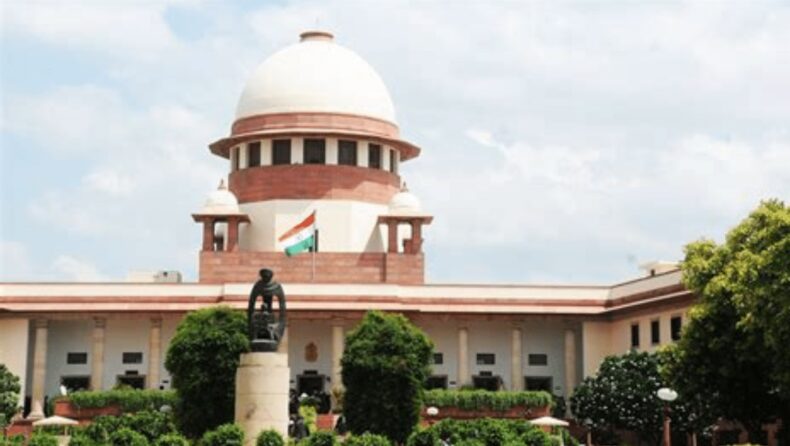According to Hindustan Times, a constitutional panel of the Supreme Court of India on Wednesday stated that marriages could dissolve owing to irreconcilable disagreements without the involvement of either partner’s guilt.
According to Article 142 of the Constitution, and the bench is now debating whether the Supreme Court can utilise this provision to dissolve marriages. The Supreme Court has occasionally used its authority under Article 142 to end marriages in the absence of any explicit legislation that acknowledges “irretrievable breakdown of marriage” as a legitimate basis for divorce. The Court’s remarks emphasise the necessity of validating “no-fault” divorces.
The Hindu Marriage Act of 1955, the Special Marriage Act of 1954, the Indian Divorce Act (Christian Marriages), and Muslim personal law all control divorce laws in India. These laws all accept divorce on the grounds of contentious divorce and agreeable divorce. Contrary to consensual divorce, which is initiated by both parties with mutual consent, contested divorces are initiated by one partner due to the other’s cruelty, adultery, conversion, desertion, or unsoundness of mind. However, starting legal action on the latter is far more difficult than on the former. Both spouses must file the petition for a mutual divorce, and the married pair must be legally separated for a predetermined period of time before starting divorce proceedings.
While Christian couples must have lived apart for a minimum of two years before filing for divorce, couples married under the Hindu Marriage Act and the Special Marriage Act must have lived apart for at least one year before filing for divorce by mutual consent. Furthermore, every couple seeking a mutual divorce must appear in court twice: once to file their petition and again after six months to provide evidence. This six-month period is known as the “cooling off period”, and it allows the parties to reconsider and reflect on their decision to divorce, according to Chennai-based divorce lawyer Chethana V in an explainer from 2021.

There are no such deadlines to follow when starting contested divorce proceedings, excluding desertion. The present ruling may influence the legislators to make it simpler to obtain a divorce, even on consensual grounds, but a more significant transformation must also occur within Indian society.
Supreme Court on Hindu Marriages
Because weddings are regarded as sacred under Hindu law, the Supreme Court noted in 2021 while dissolving a marriage on the grounds of irretrievable breakdown that this is one reason there hasn’t been legislation on irretrievable breakdown yet. In fact, there was no provision for divorce in Hindu marriages prior to the Hindu Marriage Act of 1955. Given the elevated status of marriage as a social institution in India, the court declared at the time that “society as a whole does not tolerate divorce… it is far more challenging for women to maintain social acceptance following a decree of divorce”.
It is claimed that this, together with the fact that the law does not ensure women’s economic and financial stability in the event of a breakdown of marriage, is the reason why the legislature has been reluctant to add irretrievable breakdown as a basis for divorce.
“I am in severe disagreement with rulings which show that marriage is a sacrament and it’s the national policy of India that we don’t dissolve marriages”, said advocate Indira Jaisingh, who is assisting the Court in the current proceedings, on Wednesday. Jaisingh continued, “arguments such as ‘marriage is a sacrament and thus, we must not agree to the theory of irretrievable breakdown’, do not make any sense.”
In fact, even when women experience abuse and brutality in their marriage and are left without much support from their loved ones, women are discouraged from filing for divorce in India because of the sanctity of marriage and the stigma surrounding it. Divorce is often associated with shame. Motivating oneself to leave merely to be humiliated doesn’t feel worth it when it appears like social disgrace is the only other option to abuse.
However, there are situations when the judiciary can intervene to settle issues that partners may have when filing for divorce. For instance, the Kerala High Court decided in February of this year that it would likewise be cruel for a partner to refuse to consent to a mutual separation due to an unworkable marriage. The legal definition of divorce includes both fault and consent as grounds for divorce. When one party is willing to separate from the other but neither party is willing to submit to a mutual separation because of the parties’ intrinsic differences of opinion, the court stated in its ruling that this would be cruel to the spouse who is requesting the separation.
The Supreme Court’s exercise of the authority provided to it by article 142 in the Kerala case is an example of how the courts can help ensure that citizens have access to legal remedies in the absence of legislation. The right to divorce must be included in discussions about the right to marriage, especially the right to divorce without government interference. (Source: The Swaddle)













